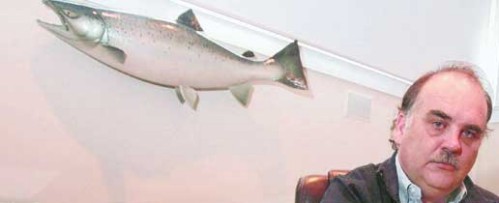High-yield - junk bond status
Revised: 31jan2013: New Brunswick multi-national Cooke Aquaculture Inc received some bad news Tuesday from New-York-based Moody’s Investment Services, who delivered a B3 – “high-yield” or “junk-bond” status – default rating for the Canadian Aquaculture giant. Standard & Poor’s issued a matching rating (B-) the same day.
The rating is the first-ever for Cooke and was provoked by a request from the firm for a credit rating prior to issing $250 million in unsecured notes, accoring to news sources. B3 connotes highly speculative and non-investment grade opportunities. In 2010, Cooke effected a demand debenture with National Bank of Canada for $350 million, using several Nova Scotia properties as security.

COOKE AQUACULTURE CEO GLENN COOKE
Perhaps even more distressing in the report was Moody's caution that, among other things, future disease incidents could hamper Cooke's capacity to meet future financial commitments. Cooke salmon farms in New Brunswick, Nova Scotia and Chile have seen several major infectious farmed salmon disease outbreaks in the past two decades, resulting in the government-ordered slaughter of millions of Atlantic salmon.
Because a B rating is the single most common rating found in a junk bond portfolio, Moody's defines its B rating additionally, “Bonds which are rated B generally lack characteristics of the desirable investment. Assurance of interest and principal payments or of maintenance of other terms of the contract over any long period of time may be small.”
Cooke had revenues of $489 million in 2012, with sales up 22% from the previous, but EBITDA (earnings before interest, taxes, depreciation, and amortization) dropped by 25% from the previous year, due to falling prices.
Credit ratings are based primarily upon the client’s creditworthiness and are generally interpreted as a direct measure of the probability of default. However, credit stability and priority of payment are also factored into the rating. Historically, 30% of firms with an initial rating of B default on financial obligations within five years and 50% within 15 years.
A B3 (B- for S&P) credit rating is the fifth-lowest possible and is designed by Moody’s to describe a firm or agency more vulnerable than those rated higher, but “having the capacity to meet its financial commitments.”
The rating scheme attached to B3 also notes that “adverse business, financial, or economic conditions will likely impair the obligor's capacity or willingness to meet its financial commitments.”
In the rationalization of factors contributing to the low credit rating, Moody’s says the rating reflects Cooke’s very high financial leverage (the extent to which a business or investor is using borrowed money.) Companies with high leverage are considered to be at risk of bankruptcy if, in case, they are not able to repay the debts, it might lead to difficulties in getting new lenders in the future.
Moody’s also cited limited free cash flow available for debt repayment. The rating also reflects the volatility in operating profits and cash flows driven by fluctuations in fish harvests and market prices for salmon, as well as susceptibility to episodic disease outbreaks.
Cooke operations over the years have proven to be extremely susceptible to outbreaks of salmon-borne diseases, especially ISA (infectious salmon anemia), who has a 90% mortality rate. A Cooke executive recently told CBC radio that there were several outbreaks at salmon farms in New Brunswick in the late 1990s and early 2000s. In the past 18 months, Cooke farms have suffered no fewer than three incidences of ISA infection, resulting in the reported slaughter of more than a million fish, with a market value exceeding $30 million.
The federal government compensates aquacultures firms at "market rate" for any fish ordered destroyed.
Cooke purchased its Chilean subsidiary Salmones Cupquelan in 2008, adding $100 million in revenue to its bottom line. Cooke produces about 3% of the salmon capacity in that country but Cooke farms accounted for 50% of the suspected ISA cases in 2011. In 2007, ISA devasted the Chilean aquaculture industry, causing immediate loss of 13,000 jobs.
On Monday, the Canadian Food Inspection Agency (CFIA) announced that eradication of ISA from Atlantic Canadian waters was not possible that that the agency would adjust its strategy to "prevention."
Biologist Alexandra Morton told SCT that she thinks Cooke's push for cash might be connected to the ISA outbreaks and the recent decision by CFIA to have the fish sold in the consumer market. "Cooke had a very handsome deal with government for large payouts every time they were ordered to cull [because of ISA]," she said. "Millions were paid for the past four outbreaks. I believe government cannot afford the payouts."
An economist with twenty years experience with aquaculture in the Maritimes told SCT, "In all of the other ISA episodes they took the fish to landfills, but now they are selling them in the supermarket? Sounds like a mad dash for cash to me."
Moody’s corporate documents explaining their rating system say that, for the lower-rated clients, “Of particular concern is the ability of management to sustain cash generation in the face of adverse changes in the business environment.”
The report does say that Cooke has a solid portfolio of aquaculture licenses and relatively short distances to its major customer markets. There also exists potential for further profitability improvement if Cooke either stabilizes or pursues other strategic alternatives for its Chilean business, which Moody’s describes as “a drag on Cooke's performance in the past 12 months.” Moody's expects Cooke's current challenges to continue for at least 12 to 18 months.
Salmones Cupquelan generated negative EBITDA for the nine months ending September 2012 and Moody’s says that Cooke will be limited in its ability to transfer cash to that business.
Moody’s says Cooke’s long term growth prospects are attractive, based on a growing demand for seafood combined with the limited supply, expected to keep fish prices elevated over the long run.
Cooke Aquaculture, with headquarters in Black's Harbour, NB, was launched in 1985 by Gifford, Glenn and Michael Cooke.
Cooke has grown in the last two decades through more than 20 acquisitions and now has 2,200 employees in Canada, Maine, Chile and Spain.
In 2012, Cooke received a $25 million subsidy from the Nova Scotia government based on assurances that Cooke would build a salmon processing plant in Shelburne and hatchery in Digby, resulting in 450 or more full-time, year-round jobs.
In February, CEO Glenn Cooke and two other senior executives continue their court battle against dozens of federal charges surrounding the alleged illegal dumping of pesticides Bay of Fundy waters surrounding thier facilities there.




Comments
Is this the first sign of the chickens coming home to roost?
Hard to believe this is the same outfit that attempted a hostile takeover of Clearwater a year ago - zounds.
We raise a glass to the MacDonald bros in their continued success.
WOW....Perhaps Moody's are environmentalists....haha.